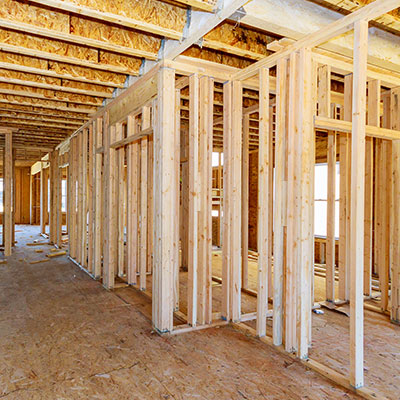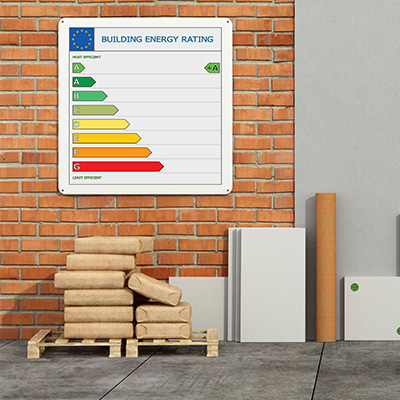Stud wall insulation is ideal for providing an extra layer of thermal insulation. It helps to better regulate the temperature of your house, and is more energy efficient, too.
When you add new walls to your home’s interior, you generally have two choices – solid walls or stud walls. The former are necessary for load bearing walls, but the latter are ideal if there is no significant weight to bear.
A stud wall is made using a simple timber frame and plasterboard, and they’re often used to split larger rooms into smaller ones. They can help you get more out of the space, and are commonly used in renovations. The beauty of stud walls is that they’re relatively easy to both install and remove - making them the optimal choice.


When making changes to the foundation of your home, stud walls are the perfect solution. This is because they’re quicker and more affordable to install than their alternatives.
However, if you’re considering stud walls instead of solid ones, it’s vital that you consider using stud wall insulation to insulate the area. You don’t want to end up with a cold and uninviting space during the winter, or one that you can’t keep cool in the summer.
The solution? Stud wall insulation. Internal stud wall insulation brings about many benefits, with the main one being that it helps you better regulate the temperature of your home. Keeping you warm in the winter and cool in the summer.
Before installing stud walls in your home, it’s worth taking the time to think about the right stud wall insulation type to use. You don’t want a thermally inefficient space in your home, so leaving the cavity between both sides of the plasterboard empty isn’t the most sensible idea.
Stud wall insulation is a must-have, but with the ever-increasing types of insulation on the market right now - you might be wondering; what’s the best stud wall insulation type?
Here at Eco Spray-Foam Systems, we want to make sure that you’re always well-informed about our products and services before you come to your final decision. That’s why we provide you with a detailed breakdown of the products we offer.
For homes with existing stud walls, there are two main types of insulation available: spray foam and loose fill.
Spray foam is applied in large quantities using a pressure spray application. It’s an excellent choice for adding to existing insulation to finished stud walls, around obstructions, and in areas with irregular shapes.
Spray foam stud wall installation is quicker and easier to use than its alternatives, and you’ll get a seamless air barrier and high U-Value.
Traditional batt forms of insulation slump over time and create air gaps, causing the U-Value to drop, and its efficiency to deteriorate.
In light of this, our experts recommend avoiding loose-fill traditional batt insulation products for your stud wall. Instead, to utilise the benefits of stud wall insulation, foam insulation should be the first choice.
From soundproofing to sustainability - stud wall insulation brings about many benefits for both the structure of your home, and your quality of life. Here are just some of the advantages you’ll reap when you install stud wall insulation.
One of the main benefits of stud wall insulation is its energy efficiency. We live in a world whereby natural resources are gradually dwindling, and our energy requirements are continuously mounting. There are changes we can make to our homes that can help counteract this - and internal stud wall insulation is one of them.
Spray foam stud wall insulation acts as air and wind barrier, thereby boosting energy efficiency by reducing the number of heating or cooling devices that you need to use in your home.
Stud wall insulation is one of the most effective ways of decreasing the amount of energy you use in the home. As a result, you can look forward to a lower energy bill, too. Whilst installing internal stud wall insulation may have a high initial upfront cost, over time, you’ll see the money you invested returned to you.
Stud wall insulation goes a long way to reduce sound and noise pollution. Whether it’s from house to house, or room to room, stud wall insulation will see that you’re less affected by any outside noise. This sound barrier will help you create a positive, peaceful living environment that you can relax in.
Another benefit of stud wall insulation is that it prevents fires from spreading throughout the house. Walls that have been insulated take longer for fires to destroy, thus slowing down the spread of the fire.
There are some key factors to consider when it comes to choosing your internal stud wall insulation.
Generally speaking, the thicker the insulation, the greater its benefits. Spray foam has a higher U-Value than traditional insulation, so offers you more thermal benefits for your desired thickness. Internal stud wall insulation requires utilising small gaps, so it’s important to have a well performing insulant.
With various types of insulation available, from open cell spray foam to closed cell spray foam, it’s important to consider their different values and moisture handling properties.
Open cell spray foam can stop sound travelling through your thin stud walls, but closed cell spray foam is a better performing insulant for your internal stud wall insulation.
The climate in your area can affect the type of stud wall insulation you should opt for. Harsher climates may need thicker insulation in order to keep the heat in more effectively.
Need advice? Contact us today and one of our friendly experts will be more than happy to help you.

Whilst having your stud walls insulated is a worthwhile investment, in order to reap the full benefits, it’s essential that it’s installed by qualified professionals, too. That’s where we come in. We’ve been in the insulation industry for over two decades, and have been delivering premium quality products and expert services throughout that time – installing all stud wall insulation types.
Our mission is to provide the latest technological insulation solutions for modern-day applications, and we are certified users of the Icynene spray foam product – the newest in the range of insulating technologies on the market today.
Let our friendly team of insulation specialists here at Eco Spray Foam provide you with a bespoke solution to your insulation needs.
If you’re interested in finding out more about the best stud wall insulation in the UK, you can get in touch with us by calling 0203 411 5188. You can also take advantage of our free insulation survey for a residential or commercial property by filling out our online contact form here.
In hot, humid climates, making a house more comfortable by dehumidifying and cooling it is a priority. Then, there’s also the matter of direct radiation from the sun beating down on your roof and west walls. The sun’s rays directly heat up the surfaces of your house, and that heat conducts to the inside. Some of the techniques you can apply are:
Having light-coloured roofs to reflect most of the radiation away from your house.
Installing a radiant barrier to reflect the heat out and cavity barrier insulator as fire protection measure.
Having a vented air cavity directly under your roof that will act like a canopy.
Usage of properly-sized overhangs and porches.
Installation of insulation systems to the right locations.
Thermal insulation consists of a single, continuous insulating internal barrier layer underneath the building envelope (that is, the exterior walls, the lowest floor, and its roof and ceiling).
Because every space is unique in terms of its floor plan, materials and so on, there is no single ideal thermal solution that can be applied to an entire design.
If you’re not certain about the type of insulation you need, first consider the climate in your area and the specific area of the property where you need the insulation installing, then consult with an expert on the best type of product for your needs.


Spray wall insulation is one of several stud wall insulations solutions to consider when you’re looking for ways to keep your house warm and reduce your energy bills at the same time. Spray foam wall insulation acts as air and wind barrier, thereby boosting energy efficiency by reducing the number of heating or cooling devices that you need to use in your home.
If you would like stud wall insulation services at the most competitive rates for your home improvement project, get in touch with us today for a quote.